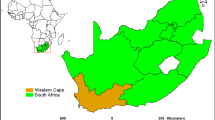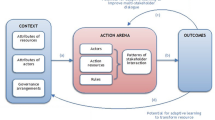Abstract
Community-based adaptation (CBA) seeks to address climate risks and socio-economic drivers of vulnerability simultaneously. However, as CBA activities appear very similar to standard development work, difficulties in identifying good practices arise. To clarify the role of CBA, this study elucidated how climate change can impact pre-existing development problems by investigating the experiences of four low-lying island communities in central Philippines. The islands currently suffer from frequent and extreme tidal flooding (following an earthquake-induced land subsidence in 2013, with a magnitude that is broadly similar to sea-level rise projections under a 1.5 to 2 °C global warming scenario), and endured a dry spell in 2016. The study also identified various publicly and privately initiated adaptation strategies, and evaluated their resilience against actual biophysical events. The study conducted focus group discussions with local leaders and in-depth interviews with government officials and residents in March 2016. Results show that tidal flooding impacted almost all aspects of daily life on the islands, while the dry spell completely depleted their limited water supplies. The strategies implemented by governments and NGOs (e.g., seawalls, rainwater collectors) were found to be inadequate in preventing tidal flooding and compensating for the dry spell. Also, communities used coral stones and plastic waste for raising the floors of their homes, which have an erosive effect on their capacity to adapt in the long term. Lack of community participation in publicly initiated projects and lack of adaptation funding for community-based strategies were the greatest obstacles to implementing climate-resilient solutions.

Similar content being viewed by others
References
Adger N (2006) Vulnerability. Glob Environ Chang 16:268–281. https://doi.org/10.1016/j.gloenvcha.2006.02.006
Adger N, Dessai S, Goulden M, Hulme M, Lorenzoni I, Nelson DR, Naess LO, Wolf J, Wreford A (2009) Are there social limits to adaptation to climate change? Clim Chang 93:335–354. https://doi.org/10.1007/s10584-008-9520-z
Ayers J, Forsyth T (2009) Community-based adaptation to climate change. Environment 51:22–31. https://doi.org/10.3200/ENV.51.4.22-31
Ayers J, Huq S (2009) Supporting adaptation to climate change: what role for official development assistance? Dev Policy Rev 27:675–692. https://doi.org/10.1111/j.1467-7679.2009.00465.x
Caras T, Pasternak Z (2009) Long-term environmental impact of coral mining at the Wakatobi marine park, Indonesia. Ocean Coast Manag 52:539–544. https://doi.org/10.1016/j.ocecoaman.2009.08.006
Church JA, Clark PU, Cazenave A, Gregory JM, Jevrejeva S, Levermann A, Merrifield MA, Milne GA, Nerem RS, Nunn PD, Payne AJ, Pfeffer WT, Stammer D, Unnikrishnan AS (2013) Sea Level Change. In: Stocker TF, Qin D, Plattner G-K, Tignor M, Allen SK, Boschung J, Nauels A, Xia Y, Bex V, Midgley PM (eds) Climate Change 2013: The Physical Science Basis. Contribution of Working Group I to the Fifth Assessment Report of the Intergovernmental Panel on Climate Change. Cambridge University Press, Cambridge, pp 1137–1216. https://doi.org/10.1017/CBO9781107415324.026
Derraik J (2002) The pollution of the marine environment by plastic debris: a review. Mar Pollut Bull 44:842–852. https://doi.org/10.1016/S0025-326X(02)00220-5
Donner SD, Webber S (2014) Obstacles to climate change adaptation decisions: a case study of sea-level rise and coastal protection measures in Kiribati. Sustain Sci 9:331–345. https://doi.org/10.1007/s11625-014-0242-z
Forsyth T (2013) Community-based adaptation: a review of past and future challenges. Wiley Interdiscip Rev Clim Chang 4:439–446. https://doi.org/10.1002/wcc.231
Horton B, Rahmstorf S, Engelhart SE, Kemp AC (2013) Expert assessment of sea-level rise by AD 2100 and AD 2300. Quat Sci Rev 84:1–6. https://doi.org/10.1016/j.quascirev.2013.11.002
Huq S, Reid H (2007) A vital approach to the threat climate change poses to the poor. In: Community-based adaptation: an IIED BRIEFING. International Institute for Environment and Development, London
International Federation of the Red Cross and Red Crescent Societies (2016) Philippines: Drought and dry spells. Web. 29 Nov 2016
Jamero ML, Esteban M, Onuki M (2016) Potential in-situ adaptation strategies for climate-related sea-level rise: insights from a small island in the Philippines experiencing earthquake-induced land subsidence. J Sustain 4:44–53
Jamero ML, Onuki M, Esteban M, Sensano XK, Tan N, Nellas A, Takagi H, Thao ND, Valenzuela VP (2017) Small-island communities in the Philippines prefer local measures to relocation in response to sea-level rise. Nat Clim Chang 7:581–586. https://doi.org/10.1038/nclimate3344
Kelley C, Mohtadib S, Canec M, Seager R, Kushnir Y (2015) Climate change in the Fertile Crescent and implications of the recent Syrian drought. Proc Natl Acad Sci 112:3241–3246. https://doi.org/10.1073/pnas.1421533112
Kelman I (2014) No change from climate change: vulnerability and small island developing states. Geogr J 180(2):120–129. https://doi.org/10.1111/geoj.12019
Klein RJT, Nicholls RJ, Ragoonaden S, Capobianco M, Aston J, Buckley EN (2001) Technological options for adaptation to climate change in coastal zones. J Coast Res 17(3):531–543
McCubbin S, Smit B, Pearce T (2015) Where does climate fit? Vulnerability to climate change in the context of multiple stressors in Funafuti, Tuvalu. Glob Environ Chang 30:43–55. https://doi.org/10.1016/j.gloenvcha.2014.10.007
Mimura N, and Patrick DN, (1998).Trends of beach erosion and shoreline protection in rural Fiji. J coast Res 37–46.
Mimura N, Nurse L, McLean RF, Agard J, Briguglio L, Lefale P, Payet R, Sem G (2007) Small islands. In: Parry ML, Canziani OF, Palutikof JP, van der Linden PJ, Hanson CE (eds) Climate Change 2007: Impacts, Adaptation and Vulnerability. Contribution of Working Group II to the Fourth Assessment Report of the Intergovernmental Panel on Climate Change. Cambridge University Press, Cambridge, pp 687–716
Monnereau I, Abraham S (2013) Limits to autonomous adaptation in response to coastal erosion in Kosrae, Micronesia. Int J Glob Warming 5:416–432. https://doi.org/10.1504/IJGW.2013.057283
Nellas AC, Arias MM, Panes HM, Dela Rosa G Jr, Arceo H and Koldewey HJ (2015) Profile of MPAs after the Bohol-Cebu Earthquake in 2013: A Biological Survey & Damage Assessment in Danajon Bank, Northwestern, Bohol, Philippines. Poster presented at the 13th National Symposium in Marine Science of the Philippine Association of Marine Sciences, Philippines
Nicholls RJ, Tol RS (2006) Impacts and responses to sea-level rise: a global analysis of the SRES scenarios over the twenty-first century. Philos Trans R Soc Lond A 364:1073–1095. https://doi.org/10.1098/rsta.2006.1754
O’Brien K, Leichenko R (2000) Double exposure: assessing the impacts of climate change within the context of economic globalization. Glob Environ Chang 10:221–232. https://doi.org/10.1016/S0959-3780(00)00021-2
O’Brien K, Eriksen S, Nygaard L, Schjolden A (2007) Why different interpretations of vulnerability matter in climate change discourses. Clim Pol 7:73–88. https://doi.org/10.1080/14693062.2007.9685639
Philippine Statistics Authority (2016) Poverty incidence among Filipinos registered at 21.6% in 2015. Web. 29 Nov 2016
Raftery AE, Zimmer A, Frierson DM, Startz R, Liu P (2017) Less than 2°C warming by 2100 unlikely. Nat Clim Chang 7:637–641. https://doi.org/10.1038/NCLIMATE3352
Reid H, Huq S (2014) Mainstreaming community-based adaptation into national and local planning. Clim Dev 6:291–292. https://doi.org/10.1080/17565529.2014.973720
Reid H, Alam M, Berger R, Cannon T, Huq S, Milligan A (2009) Community-based adaptation to climate change: an overview. Participatory learning and action, vol 60. International Institute for Environment and Development, London, pp 11–33
Schaeffer M, Hare W, Rahmstorf S, Vermeer M (2012) Long-term sea-level rise implied by 1.5°C and 2°C warming levels. Nat Clim Chang 2:867–870. https://doi.org/10.1038/NCLIMATE1584
Smit B, Pilifosova O, Burton I, Challenger B, Huq S, Klein RJT, Yohe G (2001) Adaptation to climate change in the context of sustainable development and equity. In: McCarthy JJ, Canziani OF, Leary NA, Dokken DJ, White KS (eds) Climate Change 2001: Impacts, Adaptation, and Vulnerability. Contribution of Working Group II to the Third Assessment Report of the Intergovernmental Panel on Climate Change. Cambridge University Press, Cambridge, pp 879–906
Takagi H, Fujii D, Mikami T, Esteban M (2016) Mangrove forest against dyke-break induced tsunami in rapidly subsiding coasts. Nat Haz Earth Syst Sci 16:1629–1638. https://doi.org/10.5194/nhess-16-1629-2016
Takagi HJ, Fujii D, Esteban M, Yi X (2017) Effectiveness and limitation of coastal dykes in Jakarta: the need for prioritising actions against land subsidence. Sustainability 9:619. https://doi.org/10.3390/su9040619
Vermeer M, Rahmstorf S (2009) Global sea level linked to global temperature. Proc Natl Acad Sci 106:21527–21532. https://doi.org/10.1073/pnas.0907765106
Vermeij MJA, Smith JE, Smith CM, Vega Thurber R, Sandin SA (2009) Survival and settlement success of coral planulae: independent and synergistic effects of macroalgae and microbes. Oecologia 159:325–336. https://doi.org/10.1007/s00442-008-1223-7
Warner K, and van der Geest K (2013). Loss and damage from climate change: local-level evidence from nine vulnerable countries. Int J Global Warming 5.4:367–386.
Webb AP, Kench PS (2010) The dynamic response of reef islands to sea-level rise: evidence from multi-decadal analysis of island change in the Central Pacific. Glob Planet Chang 72:234–246. https://doi.org/10.1016/j.gloplacha.2010.05.003
Yamamoto L, Esteban M (2014) Atoll Island States and international law: climate change displacement and sovereignty. Springer-Verlag, Berlin. https://doi.org/10.1007/978-3-642-38186-7
Yamamoto L, Esteban M (2016) Migration as an adaptation strategy for Atoll Island States. J Int Migr 55:144–158. https://doi.org/10.1111/imig.12318
Acknowledgements
The authors would like to thank Angelie Nellas and Xyza Kristina Billones of the Zoological Society of London - Philippines for their technical assistance during our field surveys. We are also deeply grateful for the full cooperation of the Municipal Government of Tubigon and the island communities of Batasan, Bilangbilangan, Pangapasan, and Ubay in this research.
Funding
This work was funded by The University of Tokyo, Graduate Program in Sustainability Science - Global Leadership Initiative, Chiba, Japan.
Author information
Authors and Affiliations
Corresponding author
Electronic supplementary material
ESM 1
(DOCX 5335 kb)
Rights and permissions
About this article
Cite this article
Jamero, M.L., Onuki, M., Esteban, M. et al. Community-based adaptation in low-lying islands in the Philippines: challenges and lessons learned. Reg Environ Change 18, 2249–2260 (2018). https://doi.org/10.1007/s10113-018-1332-8
Received:
Accepted:
Published:
Issue Date:
DOI: https://doi.org/10.1007/s10113-018-1332-8




